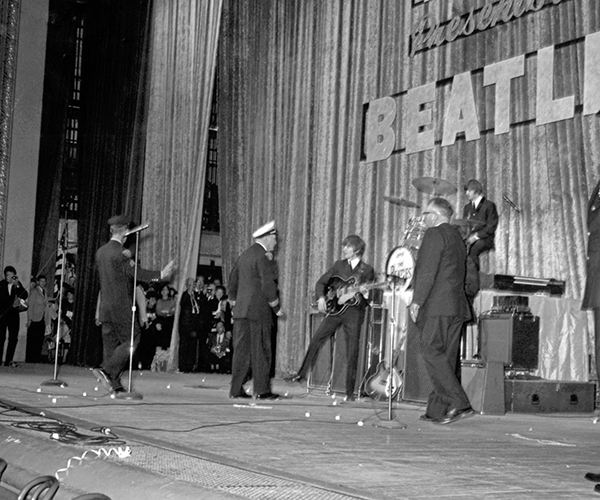“Anything Goes in GO” the Cleveland Press crooned in house ads plugging its new weekly entertainment section. But it turned out almost everything went.
Cleveland Press Advertising Director Robert Hatton calls it “The Great Kick-Ass Controversy of ’82.” WMMS-FM Promotion Director Chris Hernandez calls it “a laugh.” Press Editor Herb Kamm thought it was obscene and probably wants to forget it ever happened.
It all started when the Press recently kicked off its new weekly supplement aimed at the young rock ’n’ roll crowd, GO. There it was in the very first issue, in full-page splendor: a WMMS advertisement with hard-to-miss inch-high lightning-bolt letters screaming the rock station’s slogan, “Kick-Ass Rock ’n’ Roll.”
At least, there it was in the first few thousand papers to roll off the Press’ presses. When Kamm laid eyes on the ad he jumped on the phone to Ron Hrovath of Media Center Inc., an outside firm, which is helping the Press produce GO. “I guess he [Kamm] thought it was the most obscene and vulgar thing he’d ever seen,” says WMMS’ Hernandez.
Hrovath, in turn, phoned WMMS General Manager Walt Tiburski and told him Kamm was censoring the ad. “Tiburski took it pretty good,” says Hernandez, “although I understand we didn’t have much choice in the matter.”
The Press advertising department didn’t have much choice in the matter, either, according to Hatton. Hatton says he and others argued against censoring the ad but got nowhere. “I’m kind of a kick-ass guy myself. I voted to leave it in, but the powers that be overruled me.”
After issuing the proverbial command to stop the presses. Kamm substituted hyphens for the final two letters in the offending word. The change came too late for many Metro and Home editions, but did make the later editions. However. 50.000 copies of GO distributed free throughout the area at newsstands, record shops, colleges and the like escaped the knife.
Meanwhile the folks at WMMS were laughing their you-know-whats off. “We got a big kick out of it,” says Hernandez. “We weren’t angry or upset about it or anything like that. It [GO] is a young adult magazine, so we didn’t have any qualms about running an ad that said ‘Kick-Ass Rock ’n’ Roll.’ We use the ‘Kick-Ass’ slogan as an ID, although not in the day when housewives and so forth are listening to us. Usually it runs after 7 p.m. when no adults are listening to the radio anyhow.”
Actually the Great Kick-Ass Controversy of ’82 wasn’t the first time the new GO supplement proved to be a pain in the ... well, you know. It began causing trouble from the word go. A week before the first GO was printed, the Press ran four house ads plugging the supplement’s upcoming classified section. The Press made a pitch for the type of date-seeking personals that run in Cleveland Magazine but the sample copy was more daring than what even this establishment would print.
“Here’s an example of what we’ll run for just 50 cents a word,” declared the Press. “Desirable young man (24) who’s saddled with a ‘3’ for a live-in French chambermaid, seeks an authentic ‘10’ who can handle light housework and other ‘assignments.’ Must agree to wear black leather ‘unmentionables’ and dig whips. Send revealing pix, references to Bruno, Press Box 000.” (The editor of GO is Press rock critic Bruno Bornino) Another of the sample ads suggested that rock groups could use GO classifieds to find guitar players: “The pay isn’t much, but you’ll get to paw a lot of foxes, and until you can afford your own pad (maybe next year) you can live free with my Big Mamma and me in our van with a Jello-filled waterbed …” Another one advised, “Even if you live in a roach infested pad near Coventry … you can rent it ‘fast’ in GO classified.” A fourth sample ad showed how the owner of a “thriving head shop” who just inherited a ton of Colombia Gold from his grandmother could divest himself of his holdings: “If you can’t sell it, smoke it!”
This time it was Press Associate Publisher Jerry Merlino who was rushing to the pressroom when the first few thousand papers started coming out. Merlino ran into Kamm in a hallway. “Did you see what I saw?” Merlino asked Kamm. Kamm said, “Yeah, I saw it.”
Merlino said, “I’m on my way to pull it now.” Kamm replied, “If you weren’t going to do it, I was.”
Merlino yanked all four house ads and replaced them with tamer versions. But again, thousands of Metro edition copies were distributed before they could be censored.
Merlino blames this incident on “an overzealous copywriter.” It seems that Press people, including Merlino himself, were joking around the office about what type of personals might run in GO. “You know, whips and chains and that sort of stuff,” says Merlino. “Unfortunately the copywriter heard us and took us literally. And wouldn’t you know it, that turned out to be one of those times when the copy didn’t go through anyone else’s desk for approval.”
Advertising Director Hatton says both embarrassing incidents are the result of GO breaking new ground in Cleveland newspapering. In the future, he predicts, readers will see other things in GO that have never before appeared in the Press. “I’m sure that the Kick-Ass Controversy won’t be the last.”
And indeed, it wasn’t. Although WMMS discontinued its censored ad after that premiere issue of GO, careful readers of the supplement spotted a subtle sequel to the controversy in the very next issue a week later. A rock band review by Editor Bornino read, “...the band played one ‘kick-a—’ original after another.” These hyphens, assures Bornino, were not inserted by the management. “I did it as sort of a spoof,” says the irrepressible writer, “since that’s the way they apparently want it.”



